By Alusine Rehme Wilson
A Non-Governmental Organization, the Economic Empowerment and Human Rights Sierra Leone has on the 12th June 2021 successfully engaged key stakeholders in the North-Eastern District of Tonkolili on a capacity building dialogue focused on the Promotion of Sexual and Reproductive Health Rights-(SRHR) in the district with funding from Amplify Change.
The training took place at the Tonkolili District Council Hall and Fodie Paul Oniel Kamara; a Consultant Organization Development Practitioner was the lead facilitator. Kamara praised the participants for being responsive throughout the training sessions especially during the illustrative group discussion centered on Sexual Reproductive Health and Rights in the district. He said the participants did prove to be fit for the purpose and all their ideas and submission to the discussed are amazing for the promotion of SRHR in their district.
He highlighted that his mandate also involves putting together a draft that will be eventually validated by key stakeholders of Tonkolili before review and final adoption of the document by EEHRSL by August this year.
On his part, the Director of Economic Empowerment and Human Rights Sierra Leone (EEHRSL) Michael Lusani also expressed similar sentiments about the participants.
He underscored that the training is among EEHRSL activities line up for the 12-month project which has gained support from Amplify Change. “We are implementing this project in five chiefdoms with the aim of producing a reference document that will become an advocacy policy tool for Sexual Reproductive and Health Rights in line with the project theme: “Promoting Sexual and Reproductive Health Right in Tonkolili District.”
“This is the third training we have rolled out for these set of key stakeholders and duty bearers. Our partners from the Ministry of Basic and Senior Secondary School Education, Ministry of Gender and Children Affairs as well as the Tonkolili District Council are also involved. Already we have received commitments from some stakeholders to support our organization’s drive to help reduce the high rate of maternal mortality, teenage and adolescence pregnancies and sexual penetration and rape cases in the district,” he remarked.
Responding to questions about the project’s sustainability and inroads the organization has achieved so far, since their intervention last December in the five chiefdoms of Tonkolili District namely, Kholifa Rowala, Taneh, Gbonkolenken, Konikay Sanda and Konikay Barineh chiefdom, Lusani said they have not only trained school authorities, councillors, religious leaders among others but have also held media sensitization on local networks in the district to further broaden the understanding of the people about the dangers of depriving anyone especially women from enjoying their Sexual and Reproductive Health Rights.
He further emphasized that the Promotion of Sexual and Reproductive Health Rights is universal and for EEHRSL it remains one of their core areas of operations. This is why through this project they have successfully been able to establish health clubs in schools and pupils have since been learning and understanding a lot about their Sexual and Reproductive Health Rights as well as the limitations to those rights.
Lusani appealed for more support from the donor to tap on the energies and overwhelming statements of commitments from Local and customary Leaders, Health and Social Workers to extend the project to the remaining 14 chiefdoms in Tonkolili district by way of sufficing and sustaining the achievements of the project attained so far.
Conclusively, he threw the challenge to the Tonkolili District Council to discuss and make a budget for the final document. EEHRSL will be publishing by August before the end of the project to ensure that the document serves as an Advocacy Policy Tool for the district that can be embraced by the Council, Line Ministries and Agencies to help address the huge constraints posed by lack of knowledge on Sexual and Reproductive Health Rights.
The Gender Officer at the Tonkolili District Council Alieu Sesay was among participants capacitated by Economic Empowerment and Human Rights Sierra Leone. He said the content of the training is life changing for participants, admitting that the knowledge gained will assist him further in the best exercise of his duties as mandated by the council because EEHRSL drive to promote SRHR in the district is in line with principles and recommendations of the three Gender Acts of Sierra Leone.
“I will mount robust outreach scheme in all schools in the operational areas of the Council to further enlighten teenage and adolescent girls in schools about Sexual and Reproductive Health Rights effective next academic year,” he stated.
Mabel Farma the District Health Sister-1 at the Tonkolili District Health Management Team commended EEHRSL for their timely intervention and for considering the health sector among key partners of national development.
She confirmed that a large number of her staff and other health workers have also benefited from her ideas attained from trainings conducted by EEHRSL on Sexual Health and Reproductive Rights. “I normally share these ideas to my staff and mostly during general meetings,” she remarked.
While shedding light on primary challenges encountered in the health sector, she blamed parents and education policy makers for the high level of illiteracy among women and teenage girls on Sexual and Reproductive Health Rights which has been fuelling the gradual increase in the rate of maternal mortality as recorded in various health centers in the district. She, however, urged Government through the Ministry of Basic and Secondary School Education to reintroduce Sexual Education in school in order to reduce complications that usually arise during service deliveries.
Group presentation by participants, pre-validation of the Advocacy Policy Draft and group photo taken by participants, facilitator together with staff of Economic Empowerment and Human Right Sierra Leone climaxed the training.
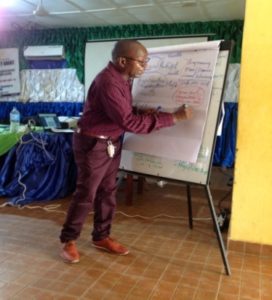
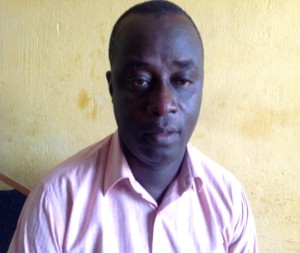
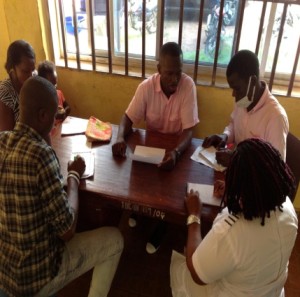
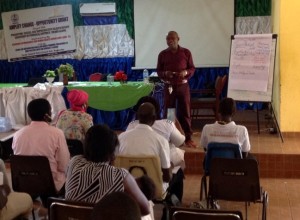

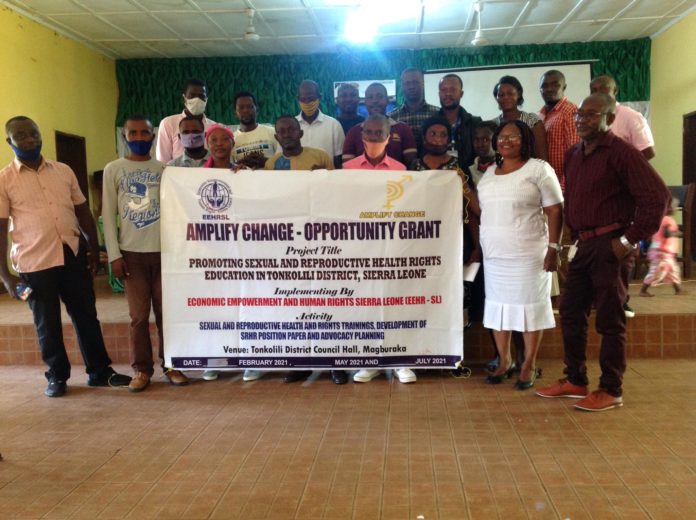



This is a laudable initiative by EEHRSL. We hope that the project outcome will contribute to teenage pregnancy in the intervention chiefdoms.
Grateful if you can share the Policy for public consumption and not only for Tonkolili.
I mean teenage pregnancy reduction in the project intervention communities